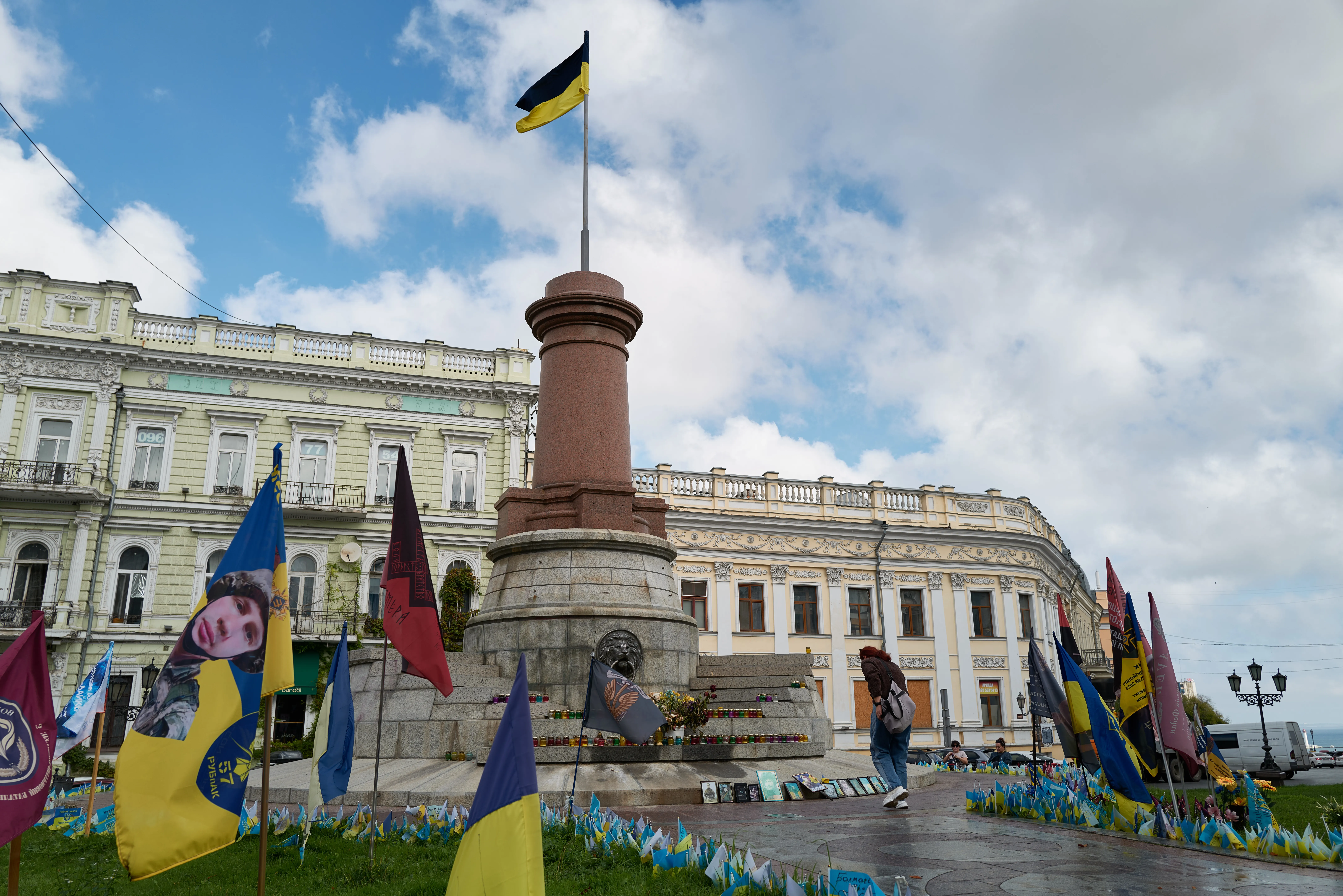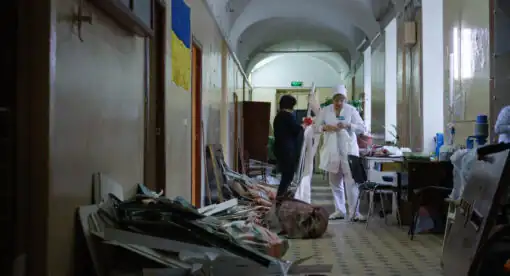In this Contours episode, host Eugene Chausovsky sits down with Mike Smeltzer, the Senior Research Analyst for Nations in Transit, Freedom House’s annual survey of democratic governance from Central Europe to Eurasia. Together, they discuss the struggles of Ukraine’s democratization, the increasing authoritarianism in Russia, and the importance of protecting Ukraine and its democracy against Russia.
Eugene Chausovsky:
Hello and welcome to the Newlines Institute for Strategy and Policy Contours Podcast. I’m Eugene Chausovsky, the senior director for Analytical Development and Training at New Lines, and I’ll be joined today by Mike Smeltzer, the senior research analyst for Nations in Transit, which is Freedom House’s annual survey of democratic governance from Central Europe to Eurasia. Mike serves as an expert on developments in the post-Soviet space in the Nations in Transit survey region. And prior to joining Freedom House, Mike’s professional experience included stints in both the nonprofit and higher education sectors where he worked in operational and research capacities. Mike, welcome to the show.
Mike Smeltzer:
Thanks for having me.
Eugene Chausovsky:
So first of all, I was wondering if you could just briefly describe the scope of the Nations in Transit report in terms of which regions and countries were covered, what elements about them were being measured, and really what was the overall purpose behind the report in the first place?
Mike Smeltzer:
Absolutely. So Nations in Transit is one of Freedom House’s annual reports that assesses the state of freedom and democracy in the world. Our sister reports are freedom in the world, which looks at political rights and civil liberties as experienced by people on the ground, and freedom on the net, which looks at the impact of internet freedom on people’s fundamental rights. Now, Nations in Transit’s a little bit different because it focuses in on a specific region that is, it looks at the formerly communist bloc stretching from Central Europe to Central Asia. And maybe we don’t like to think about it as the formerly communist bloc. But really this report began in the mid-1990s after the collapse of the Soviet Union. And so there was all of this geopolitical atmosphere of democracy’s victory. And during that time, there were these academics and democracy practitioners who were thinking about what kind of reforms non-democracies needed to put in place to become democracies.
And one line of thinking was that all of these countries needed strong democratic institutions, and if you have strong democratic institutions, you’ll have the necessary foundations for the protection and support of liberal democracy, of political rights and civil liberties. And so that was kind of the onset of this thinking of Nations in Transit, and it was built on this really simple kind of assumption or supposition that all of these countries would transit to democracy, that they would progress toward the same endpoints of peaceful democratic consolidation. But as we see now, obviously things are not quite there and things have only gotten worse over time. In fact, this report documents the 20th consecutive year of democratic decline, which we can talk more about.
Eugene Chausovsky:
Yeah, absolutely. And maybe before we do get into that, I was wondering, because you have a very detailed map here that goes into the different categories that’s covered in the report. And so maybe if you could just go over that briefly, the different categories and really what they entail as you classify each of these countries.
Mike Smeltzer:
Absolutely. So this reports classifies countries as one of five types, ranging from the consolidated authoritarian regimes at the kind of bottom of the scale, to the consolidated democracies. And these are based on the seven indicators that we measure. So we look at things like national democratic governance, electoral processes, judicial framework, corruption indicators, and then based on these seven indicators, we average out the scores to assign the countries as one of these five types. And so if you were to receive a high score, our range is kind of one out of seven. If you were to receive say a six, your country would embody the best policies and practices of liberal democracy. Maybe you face challenges. In this case, many of the democracies face challenges with corruption, but overall, you’re kind of embodying those best practices. Then at the other end, you have the consolidated authoritarian regimes, which are really at a very basic level, closed societies in which dictators or authoritarians are preventing political competition or pluralism, and in which we can see widespread violations of basic political, civil and human rights.
And importantly, there’s also a middle category, these transitional or hybrid regimes. Now, this category actually wasn’t in the original makeup of this report. It was something that was kind of added on later as our understanding of third wave democracy evolved in the early 2000s, late 1990s. And these transitional or hybrid regimes as we mostly refer to them now, exhibit both characteristics of democracies and autocracy. So they may have democratic institutions, they have elections, they’ve got democratic institutions like governments and media sectors, but they’re extremely fragile, and they’re often co-opted by autocratic practices. And so there’s these substantial challenges that exist, even in these countries that have sort of ostensibly nominally democratic institutions.
Eugene Chausovsky:
Yeah, very interesting. And I’d like to unpack that a little bit more maybe with a couple of case studies here. So one country that you cover in the report is an example of this hybrid regime that you talk about, which is Ukraine. So obviously a very important country, a country that’s undergoing a lot of challenges, not least of which is of course, Russia’s full-scale invasion, and all of the different ripple effects that has brought on Ukraine. And you write in the report essentially that Ukraine is really the only country among this hybrid regime classification that had an improved democracy score, which you continue to make considerable progress in things like building up judicial and anti-corruption institutions as well as actively investigating corruption including in the military. So I was wondering if maybe you could speak a little bit more starting on a slightly positive note in terms of a country that has actually improved its democracy score?
Mike Smeltzer:
Yeah, amidst Russia’s brutal invasion of Ukraine, and I think it’s important for your audience to remember that this war has not just been going on since 2022. It’s been going on since 2014. And the Russian Federation have been kind of sticking their fingers into the sovereignty and self-determination of Ukraine its entire independent history. And so when you look at the history of Ukraine’s scores in this particular report, it’s really important to have that context in mind, of the challenges that Ukraine has gone through historically to consolidate democracy. And as you mentioned, we call it a hybrid regime despite kind of all the rhetoric that’s out there about Ukraine being this example of democracy. But really it is truly a bright spot amongst these hybrid regimes. We’ve seen sort of this consolidation of political will, both by political actors, the policymakers, the legislators, the leaders, but also the people.
And it’s beginning to become more apparent that the society is really behind this pro-democracy movement. If you look at some of the polling coming out of Ukraine, especially since the full-scale war began in 2022, we see this desire for full-fledged democracy in Ukraine and the desire to hold their leaders accountable to that standard. And so this year, as you mentioned, we saw this improvement in the judicial sector as well as in examining corruption. Obviously Ukraine is not a perfect democracy. We do not classify it as a democracy, but nevertheless, it’s really important to highlight where these things are going well, where improvements are being made, even if they’re slow, even if they’re kind of steady or unsteady. It’s important that we highlight where we’re seeing these things. At the same time, I think it’s important to also approach it clear eyed.
We do know that there are threats to democracy in situations where a country is under attack by a foreign aggressor. The need to consolidate around a single narrative for the country and for the state is incredibly important for the defense of that country. And with that comes the risk of power consolidation by the executive or by other top actors within the Ukrainian government. Fortunately, when those things happen, society and Ukraine seems to really pay attention. It seems to really perk up and make sure that these things are progressing in a way that is kind of respecting the voice of the people. And I think that is a fundamental change that has happened in Ukraine since say, 2014, where you really see a much more responsive government to the desires of the people and those desires being we want to create a full-fledged democracy and one that is closely aligned with Europe.
Eugene Chausovsky:
Yeah, I think that’s a really interesting and important point you mentioned. I mean, looking at things like corruption in Ukraine, it’s not just a political issue, but this is something that has become almost front and center, or at least one of the main issues when it comes to things like Ukraine’s ability to sustain the support that it needs from Western countries, whether that be from Europe, from the U.S. Right now, obviously we have a funding package that’s held up in the U.S., and there’s concerns whether at the political level or even at the social level in some of these countries over whether or not that Ukraine will use those funds in a transparent and an effective way, or whether they’re more subject to corrupt practices.
But as you said, society not being behind this movement, clearly no government really in any part of the world has zero corruption. But in Ukraine’s case, I think it’s particularly important in not only being able to wage the war, basically being able to defend itself against Russia’s war, but also to maintain the support from the West. So I was wondering if you maybe could speak to that a little bit?
Mike Smeltzer:
Yeah, I think it’s really a Herculean effort that Ukraine is putting on the Ukrainian people, the Ukrainian government, of doing the slow, painstaking, methodical work of improving one’s democracy while fighting what is truly an existential battle. And it’s important that policymakers in the U.S., the EU and other democracies really recognize what it is Ukraine is fighting for. Because it’s not that they’re just fighting for their own existence, which is first and foremost, but they’re really fighting for an international system in which the norms of sovereignty and non-aggression and self-determination are respected.
And so I think it’s getting lost a little bit in the politics in many of these countries of the importance of supporting Ukraine to win because what kind of message does it send to the other autocrats in the world if Ukraine loses. That the West, that democracies will not stand up for one another, and that it’s just a return to a period of might makes right. And so it’s incumbent upon these other democracies, especially the United States and the European Union, to get their act together and to really ensure that Ukraine wins. And not only that Ukraine wins, but that Ukraine wins on Ukraine’s terms, that this is a fundamentally respecting Ukrainian agency and sovereignty and how they want to push forward towards democracy.
Eugene Chausovsky:
Yeah, absolutely. And so we’ve mentioned how Ukraine was one of the few kind of bright spots in a way, at least relatively speaking in terms of an improved democracy score as part of your report. But if we kind of look on the other end of the spectrum on the authoritarian regime side, obviously Russia is the elephant in the room here, and we’ve seen whether it be through crackdowns on opposition or the most recent election held in Russia, which was barely contested in the first place. I was wondering whether you can speak to some of your report’s findings on Russia’s place in the spectrum?
Mike Smeltzer:
Yeah, unfortunately, Russia is one of these countries that has fallen the furthest in the 20, 30-year history of this report. Over the last 20 years, I believe it ranks third or fourth as having fallen the furthest in its democracy scores. That I think is notable because of how low it already started. It had never really achieved this level of consolidated democracy that we saw in say, Central or Eastern Europe in the ’90s. It never saw what the Estonia’s, Latvia’s, Hungarian’s and Poland’s experienced. It really struggled through a period of political chaos in the ’90s, and then came under strict authoritarian control under Putin in the 2000s, and has only gotten more consolidated in his authoritarian grasp of Russia over the years. And so over time, Russia’s scores have frankly reached the bottom of this indicator or of the scale. Many of the indicators are already at the lowest points.
That is to say that there’s no democratic character left to the institutions of say, national governance or the independent media. And it’s a real challenge to talk about every year because our scores don’t continue to decline for Russia, at least not very much. But things as we see them and as we understand what’s happening in Russia, they’re getting much, much worse. And so you’re right to point out the most recent elections as being not free and not fair. In fact, we declined Russia’s electoral process score to the lowest possible score, not because of these elections, but because of last year’s regional elections in which in Russia in the past there had been at least a patina of room for some systemic or genuine opposition to maybe win on a city council in Novosibirsk or to win a governorship in the Irkutsk Oblast. But what we’ve really seen is, especially since the full-scale invasion of Ukraine, that the regime has kind of closed the door on letting any dissent bubble up.
And we see this, I think most acutely in the killing of Alexei Navalny in a Russian penal colony in February. The man is behind bars for decades, and the decision is we should let this guy die or possibly kill him. Obviously, we don’t know the exact cause of death, but certainly he should not have been there. And as a result of the Russian regime, the Kremlin are ultimately responsible for that. And I think that is really just emblematic of the depths of autocracy to which the Kremlin and Putin’s Russia have sunk over time. And one of the unfortunate sayings that we have on our team working on Nations in Transit is that things can always get worse, because after 20 years of democratic decline, we’ve really seen it in many of these countries, even those that have already reached the bottom of our scale.
Eugene Chausovsky:
Yeah, definitely a concerning trend within Russia. And I also wanted to highlight another really fascinating point that’s been made in the report about trends between these autocratic or authoritarian regimes themselves. So in the report you write that whether it’s through security agreements or things like energy deals, joint investment, you note that today’s autocrats cooperate with like-minded leaders inside and outside the countries covered in the report in order to do things like cement their rule and create a global system hospitable to their “ilk.” Quote, unquote. So that’s a really interesting thing that I was hoping you could flesh out a little bit more, maybe even bringing some examples of what you mean here within the region and perhaps even beyond it.
Mike Smeltzer:
Yeah, absolutely. I think as we were looking at what was happening between these countries and asking a question of how stable are these consolidated autocracies, because we know there’s a lot of academic literature that shows that these autocracies can be quite unstable, especially when they’re personalist regimes where you have somebody kind of at the top who’s running the show and then all the actions filter down this pyramid or this ladder to the cronies. That can be a really unstable system. But what we’ve seen is that the stability of that system can actually be reinforced by cooperating with other authoritarian regimes in other states. And so it all connects back to this idea of what Anne Applebaum, the experts on post-Soviet, post-communist space would call Autocracy Inc. Right? Autocracy Incorporated. The ways that we see autocrats increasingly working together to maintain their rule and to kind of subvert the international liberal order that was created after the collapse of the Soviet Union.
And so there are lots of examples that we’ve seen throughout the years in this Nations in Transit region. You can point to 2020 elections, the presidential elections in Belarus, in which Alexander Lukashenko had already kind of thrown all of his opponents in jail, and Sviatlana Tsikhanouskaya took over the spots of her husband in the elections, and there were massive protests against the results, which had Lukashenko winning by some 80 to 90%. And these massive protests were the first of their kind really in the post-communist history of Belarus. And what did Lukashenko do? He called Putin for help. He asked them to bring in not only security services, but even just media figures to come in and to put on the airwaves that things are going well, that there’s a coup happening, that it’s the demonic West trying to overthrow Lukashenko. And Lukashenko was successful in kind of pushing down the dissent with the help of Putin.
And then in return, Lukashenko has paid that favor back by allowing Belarus to be a staging ground for Russia’s invasion of Ukraine. And he further helped by mollifying Yevgeny Prigozhin, whom your listeners may remember, kind of started his own mutiny against Putin earlier last year. And Lukashenko kind of greased the wheels to get Prigozhin to back down. And so these two autocrats are kind of helping each other maintain stability in each other’s countries. But as you said, it goes beyond this, right? There are other autocracies, China, there’s Iran, there’s North Korea that are aiding in Russia’s ability to continue to wage war in Ukraine. So Iran and North Korea are supplying Russia with drones and ammunition to continue to fight the war in Ukraine. China is helping Russia get around some of the sanctions that the West has put on.
And so there are all these ways in which these authoritarian regimes are cooperating, and it’s not the same cooperation that we see amongst democratic communities and democratic societies. It is really transactional. It’s really self-interested. And I think one thing that we try to get across is the way that they’re trying to create this global system that lets them to continue to take advantage and most importantly, stay in power. The way they can just shake off the yoke of democratic norms and institutions in the long-term. And I think it’s something that we’re going to continue to see going forward.
Eugene Chausovsky:
So you’ve pointed to some really interesting trend lines both within the regions and the countries covered in this report. And as you’ve just kind of noted with Russia and countries like Belarus, but also beyond this region, Iran, China, very interesting things happening that are very consequential. So my final question, because we could go into a lot of different countries and case studies, but I’ll leave it to the listeners to check out the report itself, is what can be done about this? I mean, given the concerning trend lines that you’ve outlined, as well as even political changes potentially within the U.S. and EU and upcoming elections that are also mentioned in the report, what recommendations would you have to mitigate or even reverse some of these more concerning trends?
Mike Smeltzer:
It’s such a great question, and I think when you work on this report, it’s often easy to identify what’s going wrong and not very easy to identify what we should do about it. This report has documented 20 years of democratic decline in this region, and that suggests that our policy recommendations that we put together every year are not having a great impact. But nonetheless, we still are putting out this clarion call for democratic actors and supporters throughout the world to take specific actions to kind of revitalize democracy and roll back these authoritarian games. So I’ve already mentioned that our first and foremost recommendation is to help Ukraine win. That has to be number one. We must sustain and increase the military, humanitarian and budgetary aid to Ukraine. That is the most vital part of defending democracy in Europe and beyond. But also I think it’s going to take many of these democracies to look inward, particularly at what’s happening in the EU and looking to how they can support democratic renewal and reform.
The democracies of Europe are struggling. They are either stagnating in their democracy scores or slightly improving, but the long-term trend is one of democratic backsliding and decline. And so we feel that it’s really important that policymakers and donors really recognize that many, would be reformers in the EU, are really struggling to push through these major changes. And so it’s important that we look at kind of the institutional legal framework that’s been damaged by these previous liberal governments and think creatively cross regionally about how we can address many of these, particularly rule of law concerns. I think there’s also those countries that the hybrid regimes that I mentioned that are really caught in between both the democracies and the autocracies, and it’s really important that we make clear the advantage that democracy provides to them, that there is prosperity in democracy. And for decades now, some of these countries have been in the EU accession process, but have failed.
Now, Ukraine, Moldova, Georgia, Bosnia, even Kosovo is kind of in the wings. A lot of these other countries are now entering the waiting room for the EU. But that doesn’t change the fact that the messaging and support to those aspiring democracies has been inconsistent. And so a big thing that we’re asking this year is that they’re just being a more tailored, concerted, consistent engagement with these countries to really finally get them in the EU. And I think the last thing that I want to mention is it’s really easy to be defeatist about what’s happening in these autocracies, right? It’s very hard to see what leverage we have over them to help improve the situation for the people living in these countries.
Nevertheless, we really feel that it’s important that we continue to seek accountability for human rights abuses and really stand with those human rights defenders that are working in the most difficult circumstances, whether that be working with them on the ground or as we’re seeing increasingly working with those that are doing their work in exile. And so it’s really important that we use every tool and resource we have to help these people continue to shine a light on what’s happening in these countries so that at least in the long-term, we can know what changes need to be made, what people need to be held accountable, and what are the bright spots that we can rely on in the future in these countries.
Eugene Chausovsky:
Absolutely. Well, I could go on and ask a ton more questions, but we’ll have to leave it there. Listeners can check out the report by Mike and his co-author, Alexandra, on Freedom House’s website, that’s freedomhouse.org. We’ll have to leave it there. But thank you very much, Mike. Thank you all for listening, and take care, everyone.






